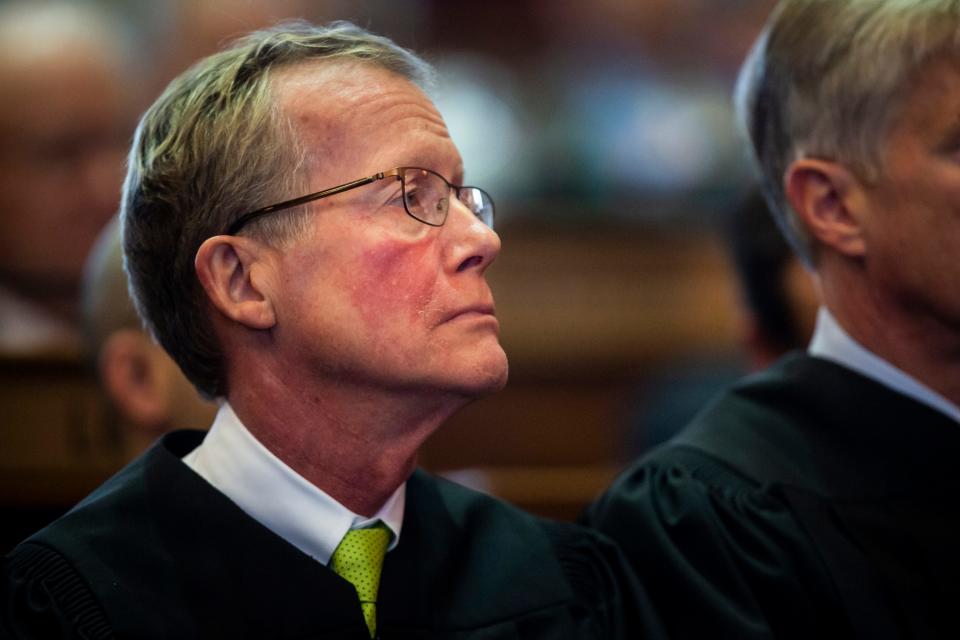Is a murder suspect's rap video evidence? Iowa Supreme Court says, in some cases, yes
- Oops!Something went wrong.Please try again later.
A judge overseeing a Sioux City murder trial did not err in letting jurors hear the defendants singing a rap song containing threats to the victim days before he was killed, the Iowa Supreme Court says.
Martez Harrison, known by the nickname "Tezzo," was shot and killed outside a bar in April 2021. Video of the dispute shows Harrison was embroiled in a fistfight with Lawrence Canady III and was on his back, with Canady punching him, when Dwight Evans approached and shot him twice in the stomach.
Canady and Harrison were friends, according to trial testimony, but Canady was there that night looking to beat up Harrison for allegedly striking another man's girlfriend. Canady also was friends with Evans, and the two had come to the bar together.
Both men were tried, separately, for murder, and prosecutors argued Canady and Evans had planned the assault together. Evans was convicted of murder, and Canady of lesser charges of voluntary manslaughter, willful injury and assault.
On appeal, Canady argued the court permitted inadmissible evidence to be shown to the jury. In particular, he objected to a video from Evans' phone, taken four days before the shooting, of the two of them singing a rap song that included threatening statements about "Tezzo."
In a unanimous decision Friday, the Supreme Court sided with the district judge, reversing an earlier decision by the Iowa Court of Appeals. An attorney for Canady did not respond to a message seeking comment.
When can rap music be used as evidence?
Evidence of criminal defendants performing or listening to violent rap lyrics is controversial because of fears it might unduly bias jurors. Other courts have held that only when the defendant himself is performing the music, and only when the lyrics are tied to the specific circumstances of the alleged crime, is such evidence admissible.
Canady's attorneys argued at trial that the rap video had nothing to do with the crime. Not only was it recorded before Canady learned about the alleged assault that made him want to fight Harrison, but he and Evans didn't even write the lyrics. The two were singing along to a pre-existing video by a Chicago rap group, one with hundreds of thousands of views online, that referenced someone named "Teso."
More: New trial for man in 2018 fatal stabbing negated by Iowa Supreme Court
The American Civil Liberties Union of Iowa, in a brief supporting Canady, urged the court to rule singing along to someone else's music is inadmissible evidence in criminal prosecutions.
"Just as singing along to Johnny Cash’s Folsom Prison Blues is not evidence that the singer 'shot a man in Reno,' rapping along to someone else’s 'diss track' is not evidence that the rapper has criminal intent," ACLU Legal Director Rita Bettis Austin wrote.
Prosecutors argued that, even though Canady and Evans hadn't written the lyrics in question, the fact that they specifically chose a song making threats to someone sharing Harrison's nickname just days before killing him was fair game for a jury to consider.
Bias from rap video not a concern in this case, court finds
Courts have repeatedly warned that violent rap lyrics cannot be used in a way to suggest a defendant is generally prone to or glorifies violence. That's not an issue in this case, Justice Edward Mansfield wrote for the court, because the jury already had video showing Canady was beating Harrison when he was killed.

"The tendency to infer that someone committed a particular act of violence because that person rapped about acts of violence is less of a concern when the acts of violence and who committed them are undisputed," Mansfield wrote. "At the same time, the joint conduct and statements on the video were helpful to rebut the notion that Evans acted alone in shooting 'Tezzo' without Canady’s knowledge or approval."
More to the point, Mansfield said, if prosecutors offered the video to show Canady was planning the killing days in advance, it didn't work. The jury acquitted him of murder, convicting him instead on the lesser manslaughter charge.
"That verdict suggests that the jury put aside any inference of advance planning from the cell phone video," he wrote. "Rather, the jury must have determined that Canady and Evans acted in concert outside the bar... but that the situation was provoked by Harrison and there was no advance plan to kill or harm him."
Austin, of the ACLU, said in a statement the decision is narrow and leaves courts the discretion to restrict evidence of rap music in other cases.
"This opinion does not limit the ability of courts to exclude such evidence after weighing the facts in each case if it determines that the potential for such evidence to be harmful to a criminal defendant's right to a fair trial with a jury outweighs its probative value," Austin said. "We believe that should be the result in most cases."
The decision reinstates Canady's conviction after the Iowa Court of Appeals reversal. He was sentenced to consecutive terms totaling 16 years in prison.
William Morris covers courts for the Des Moines Register. He can be contacted at wrmorris2@registermedia.com or 715-573-8166.
This article originally appeared on Des Moines Register: Iowa Supreme Court affirms use of rap video in Sioux City murder trial

